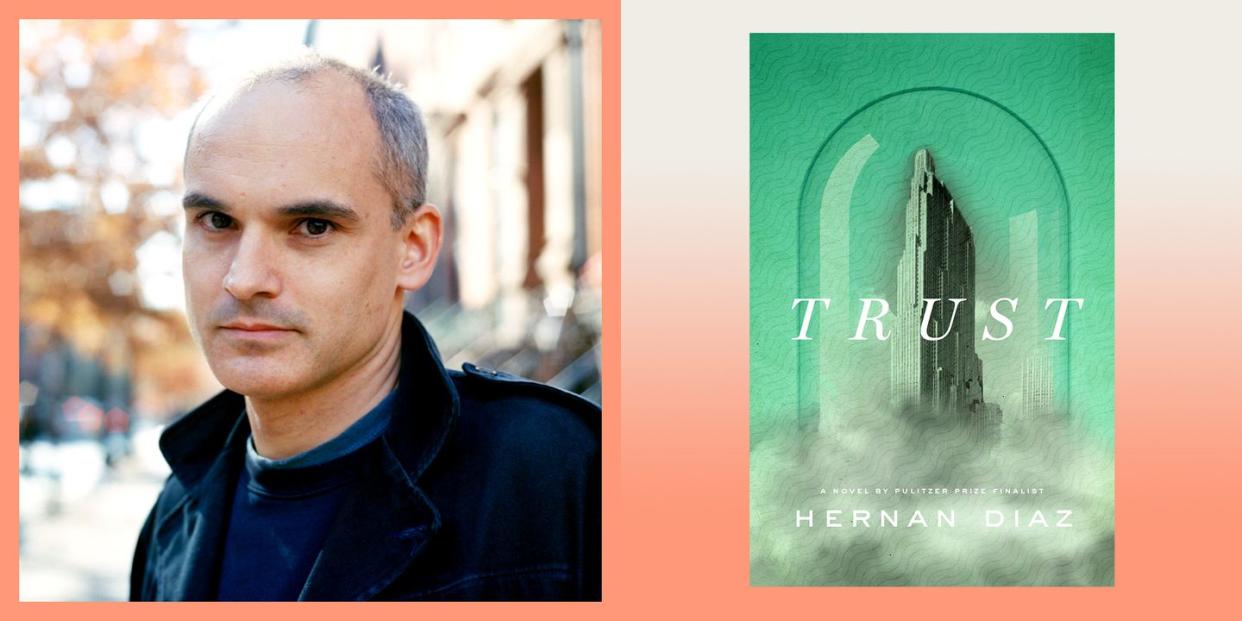Hernan Diaz Reveals the Cover of His New Novel, "Trust"

"Hearst Magazines and Yahoo may earn commission or revenue on some items through the links below."
As we kick off Hispanic Heritage month, we’re already gazing ahead at the dazzling books and prodigiously gifted authors coming next year. Hernan Diaz’s Trust, which Riverhead is publishing next May, is a virtuoso performance by an emerging talent whose first novel, In The Distance, was a finalist for the Pulitzer Prize and PEN/Faulkner Award. Trust is four books in one: a novel-within-a-novel, a partial manuscript, a memoir, and a diary. Together they enlist the reader as a detective, sorting through a range of accounts to get to the truth of what happened to a patrician Manhattan couple during the Roaring Twenties and Great Depression, when a Wall Street tycoon enhanced his wealth as his peers lost theirs. All the tensions that accrete with vast fortunes weave into a spellbinding tale that illuminates the impact of money on all of our lives.
Trust explores the many facets of the enigmatic financier Andrew Bevel and his marriage to Mildred, a secluded spouse with hidden talents. Bevel turns to his secretary, Ida, the daughter of an Italian immigrant, to shape his memoir on the page, a springboard to her own eventual career as a writer. Ida is secretly conflicted by the origin of her own success, which brings her back, decades later, to the long-dead Bevels. “What role did women have in that world?” Diaz asks rhetorically. “They did not exist except as wives and secretaries—it was enraging and intriguing in equal measure.” Characters and readers alike circle Bevel and the money and social standing that allow him to forge his own myth.
“I wanted to write a novel about wealth and capital, about the process of accumulation of capital,” Diaz tells Oprah Daily, noting that very few novels have directly engaged with these ideas: “Class, yes. Capital, no.” Alternating perspectives was critical to the novel’s structure. “Vast fortunes are made by invisible multitudes; to narrate Trust from a monolithic point of view seemed wrong. The story was necessarily prismatic, necessarily mediated.” As a New York Public Library Cullman fellow, Diaz steered clear of weighty academic tomes, gravitating instead to industry journalism from the 1920s and ‘30s, among them the Wall Street Journal, Fortune, and Barron’s. He unearthed the kind of discourse that enriches Trust, from riffs on tariffs and tax cuts to insurgent nationalism. We’re back to the future.
His research parted the curtain on a high-stakes world alien to most of us while evoking its mystique and glamor. “The inner workings of making money are arcane,” Diaz says. “The book had to have an enigmatic quality, probing forces that control our lives and yet we don’t understand them. And while the math and sociological reality of capital are immensely complicated, there’s a mystical quality to it which is deliberate.” Capital is associated with “new” money, something you grow, transaction by transaction, at the expense of others. It’s often predatory. By contrast “old” money is “more akin to treasure,” inherited, divorced from labor. Despite the best intentions of elites, the public square sprawls relentlessly around them. Trust “triangulates between Brooklyn, downtown Manhattan, and the Upper East Side,” Diaz says. “On one side of the East River was the richest, most luxurious city on the planet; on the other side Brooklyn was grappling with the largest migration in human history.”
“The book had to have an enigmatic quality, probing forces that control our lives and yet we don’t understand them."
His voice—witty, elegant, piercing—pays homage to arguably the most perspicacious observer of Manhattan high society: Edith Wharton. Is Wharton still relevant in our own age of obscene wealth and inequity? “Yes!” he says emphatically. “Wharton is an author who never feels academic, enshrined, embalmed—she feels so, so alive. The ways she talks about class and gender are absolutely current, and the issues she discussed in her books a century ago remain unresolved. She was an exquisite artist in her own right: living literature, not just a figure in a syllabus.”
Trust, too, is about the trust a reader places in an author, a good-faith handshake that Diaz toys with as he twists the reliability of his narrators. “The contract between writer and reader–and I want to emphasize the financial meaning of ‘contract’—automatically creates an upper hand in the deal. I want to put the deal on shakier grounds, rewrite the contract.”
At a moment when our social compact is on the ropes, Trust is that rare thing: a beautifully crafted novel that dares to confront some of our deepest socioeconomic schisms. “The great promise of the United States is class mobility, that we’re able to ascend the social ladder in equal,” Diaz says, before a sigh of reflection. “A statistical impossibility.”
Want More Stories To Inspire You To Live Your Best Life? Sign Up To Become An Oprah Insider!
You Might Also Like

